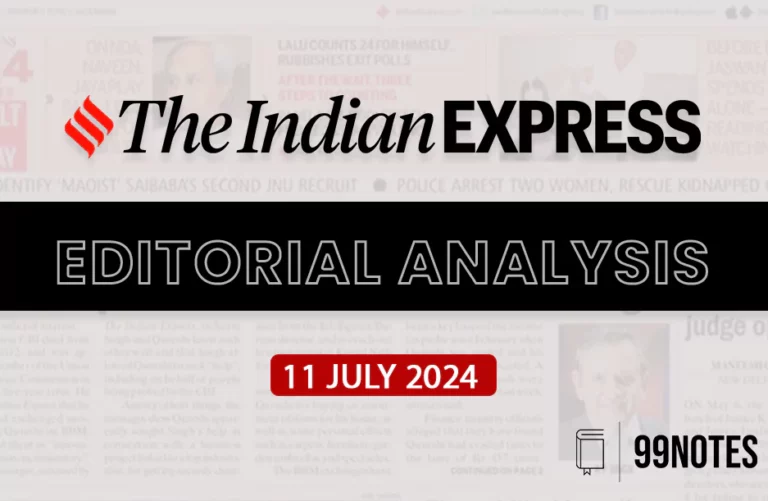25 Jan 2024 : Indian Express Editorial Analysis
Indian Express Editorial Analysis
25- January-2024
1. COVERING THE DISTANCE
| Topic: GS2 – International Relations- Bilateral relations This topic is not much relevant in the context of Prelims but more for Mains in the context of Indo-French relations. |
| Context: |
|
Complementary Relationship: Historical Trust and Cooperation:
- The relationship between India and France is marked by complementarity, devoid of historical baggage or major bilateral differences.
- Even when differences arise, both countries exhibit a remarkable ability to overcome them.
- The time-tested nature of their relations is evident in their ability to navigate various challenges, making their friendship resilient.
French President Macron’s Visit: Symbol of Strong Bonds:
- French President Emmanuel Macron’s visit to India as the chief guest for Republic Day exemplifies the deep and natural bonds between the two countries.
- France holds a unique position in India’s strategic thinking, being a steadfast supporter through significant events such as India’s nuclear tests in 1998, advocacy for permanent UN Security Council membership, and cooperation in countering terrorism.
Strategic Cooperation and Support
- France’s role in bolstering India’s defense capabilities, including defense production, nuclear and space sectors, and intelligence sharing, is pivotal.
- The open-ended cooperation has strengthened India’s hard power.
- France’s support extends to promoting India’s interests in the European Union and offering strategic assets in the Indo-Pacific, showcasing a robust partnership.
Shared Values and Challenges
- Both nations celebrate their commitment to multiculturalism and pluralism, demonstrating their policy of strategic autonomy without being anti-Western.
- They empathize with each other’s challenges, such as France’s disappointment over the cancellation of a submarine contract by Australia and India’s experience with cross-border terrorism.
Macron’s Contributions and Expectations:
- French President Macron’s significant role in the India-France relationship cannot be overstated.
- His upcoming visit, the third to India, underlines the deepening ties.
- With global tensions and uncertainties, Macron’s unique position as the senior-most leader in Europe provides an opportunity for India and France to act as a bridge between the West and the East, contributing to global stability and cooperation.
Future Cooperation and Expectations:
- Every summit meeting between leaders results in new areas of cooperation.
- The forthcoming visit is expected to bring forth new announcements in military and technical cooperation, spanning engines, aircraft, submarines, space, digitalization, cyber security, and climate change.
Macron’s Role Amid Global Uncertainties:
- President Macron’s role becomes even more critical in times of global tensions.
- At the age of 46, he stands as the senior-most leader in Europe, presenting an opportunity for him and Prime Minister Modi to harness their friendship for bridging gaps between different regions and geopolitical landscapes.
Conclusion:
- France’s early bet on India is reaping dividends, with the relationship evolving into a robust partnership.
- The visit of President Macron symbolizes the success of their strategic cooperation and shared values, underlining the significance of their kindred alliance on the global stage.
| PYQ: What can France learn from the Indian Constitution’s approach to secularism? (150 words/10m) (UPSC CSE (M) GS-2 2019) |
| Practice Question: Discuss the significance of French President Emmanuel Macron’s visit to India as the chief guest for Republic Day, emphasizing the unique position of France in India’s strategic thinking. (200 words/12.5 m) |
2. Law sans safeguard
| Topic: GS2 – Governance- E-governance This topic is relevant for both Prelims and Mains in the context of Telecommunications Act (TA) 2023, its implications on citizen rights, and the challenges in regulatory oversight. |
| Context: |
|
Evolution of Telecommunications Regulation in India:
- The institutional framework for telecommunications in India dates back to the late 1990s, driven by private sector investment.
- The Telecom Regulatory Authority of India (TRAI) and the Telecom Dispute Settlement Appellate Tribunal (TDSAT) were established to address the challenges posed by private sector involvement and excessive litigation.
- However, the relationship between the executive and the regulatory bodies has often lacked the intended separation of powers.
Challenges in Regulatory Oversight:
- The desire to serve in regulatory regimes has, at times, been clouded by the pursuit of securing long-term positions, leading to conflicts of interest.
- This phenomenon is not unique to India but extends to other democracies. The intricate relationship between the legislature and the executive in the telecom sector often undermines the separation of powers envisioned.
Safeguard Erosion in Telecommunications Act 2023
- The passing of TA 2023, aimed at modernizing telecommunications laws, poses challenges to safeguarding citizen rights.
- While purportedly discarding colonial-era laws, the act retains some provisions with ambiguous drafting.
- For instance, the definition of telecommunication services is open to interpretation, potentially bringing internet-based services like WhatsApp and Gmail under its purview.
Privacy Concerns and Ambiguous Provisions
- Provisions in TA 2023 that empower the government to notify standards and demand alternatives to end-to-end encryption raise privacy concerns.
- Ambiguities in the legislation, such as requiring messages to be disclosed in an “intelligible format,” conflict with end-to-end privacy engineering principles.
- The potential tinkering with encryption may create vulnerabilities and compromise user privacy.
Expansive Interpretation of Information Sought
- Section 20(2) of the Act outlines grounds on which information may be sought, including sovereignty, integrity, security of the state, and public order.
- While appearing reasonable on the surface, the current phrasing allows for expansive interpretation, potentially exceeding the intended scope and providing room for overenthusiastic enforcement.
Lack of Procedural Safeguards and Oversight Mechanism
- The Act lacks procedural safeguards in interception and suspension orders related to telecommunications.
- 1The absence of an independent oversight mechanism raises concerns about unchecked government power.
- The rules framed in 1996, in line with the Supreme Court’s directions, do not establish a robust separation of powers, reflecting inadequate institutional integrity.
Conclusion:
- The article highlights the need for effective safeguards and an independent oversight mechanism to protect citizen rights in the evolving landscape of digital governance.
- It emphasizes the importance of separation of powers and underscores the necessity of maintaining institutional integrity to prevent the misuse of governmental authority.
| What is the Status of the Telecom Sector in India? |
Status:
|
| PYQ: In India, which of the following review the independent regulators in sectors like telecommunications, insurance, electricity, etc.? (2019) 1. Ad Hoc Committees set up by the Parliament 2. Parliamentary Department Related Standing Committees 3. Finance Commission 4. Financial Sector Legislative Reforms Commission 5. NITI Aayog Select the correct answer using the code given below: (a) 1 and 2 (b) 1, 3 and 4 (c) 3, 4 and 5 (d) 2 and 5 Ans: (a) |
| Practice Question: Evaluate the challenges in the existing institutional regime for telecommunications governance and propose measures to ensure a balance between national security concerns and safeguarding individual liberties. (200 words/12.5 m) |
For Enquiry

13 Feb 2024 : Daily Current Affairs Quiz

13 Feb 2024 : Daily Answer Writing

13 Feb 2024 : Daily Current Affairs

13 February 2024 : The Hindu Editorial Notes PD

13 Feb 2024 : Indian Express Editorial Analysis

13 February 2024 : PIB Summary for UPSC

12 Feb 2024 : Daily Current Affairs Quiz

12 Feb 2024 : Daily Answer Writing

12 Feb 2024 : Daily Current Affairs

12 Feb 2024 : Indian Express Editorial Analysis
Daily Quiz 13 Feb 2024 : Daily Current Affairs Quiz 13 Feb 2024 : Daily Quiz…
mains answer writing 13 Feb 2024 : Daily Answer Writing Mains Answer Writing
13-February-2024
Q1) With the help of a map, show major ocean currents of the world….
Daily Current Affairs 13 Feb 2024 : Daily Current Affairs Daily Current Affairs
13-February-2024- Top News of the Day
1. Indian Navy Personnel Released from Custody…
Feb 2024 The Hindu 13 February 2024 : The Hindu Editorial Notes PD The Hindu Editorial
13-February-2024
1. A global alliance to bridge the gender equity gap
Topic:…
Indian Express 13 Feb 2024 : Indian Express Editorial Analysis Indian Express Editorial Analysis
13-February-2024
1. A science for us
Topic: GS2 – Governance…
feb 2024 PIB 13 February 2024 : PIB Summary for UPSC PIB Summary for UPSC
13-February -2024
1. Union Minister G Kishan Reddy inaugurate regional centre…
Daily Quiz 12 Feb 2024 : Daily Current Affairs Quiz 12 Feb 2024 : Daily Quiz…
mains answer writing 12 Feb 2024 : Daily Answer Writing Mains Answer Writing
12-February-2024
Q1) “Water scarcity threatens economic and social gains…
Daily Current Affairs 12 Feb 2024 : Daily Current Affairs Daily Current Affairs
12-February-2024- Top News of the Day
1. Great Indian Bustards give Nandyal a…
Indian Express 12 Feb 2024 : Indian Express Editorial Analysis Indian Express Editorial Analysis
12-February-2024
1. CLASSROOM VS COACHING
Topic: GS2 – Social…


